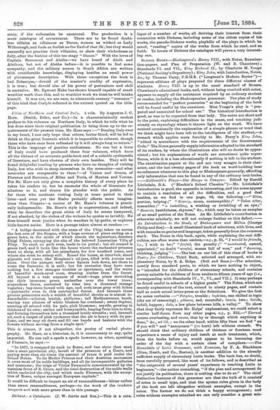Cities of Northern and Central Italy. 4 vols. By Augustus
J. C. Hare. (Smith, Elder, and Co.)—In a characteristically modest preface to his volumes on Northern Italy, in which he tells what he has done since their original publication to bring them up to the re- quirements of the present time, Mr. Hare says :—" Bearing Italy ever in my heart, loan only hope that others, better fitted, will be led to drink at the great fountain which it is impossible to exhaust, though those who have once been refreshed by it will always long to return." This is the language of genuine enthusiasm. No one but a lover of Italy could have produced these four volumes, which have all the virtues of an accurate guide-book and of a reliable cycloptedia of literature, and have charms of their own besides. They will be found delightful reading by persons who have no thoughts of visiting Italy, bat who wish to steep themselves in the memories—and what memories are comparable to them ?—of Venice and Genoa, of Florence and Ravenna, of Milan and Turin, of Mantua and Verona. For Mr. Hare not only gives a complete history of every place he takes his readers to, but he ransacks the whole of literature for allusions to it, and shares his plunder with the public. As for those who meditate visiting Italy at some period in their lives—and even yet the Rialto probably affects more imagina- tions than Niagara—a course of Mr. Hare's volumes is practi- cally indispensable. Mr. Hare's style is unpretentious, and indeed, when he describes the great cities of Italy he seems hampered, if not abashed, by the riches of the writers he quotes so lavishly. He does himself most justice when he wanders in by-paths, or explores little-known nooks. Here is a passage taken almost at random :— "A bridge decorated with the arms of the Chigi takes us across the last arm of the Stagno, with a huge avenue of pines ending on a green lawn, in the midst of which stands the mysterious, desolate Chigi Palace, occupying the site of the beloved Laurentine Villa of Pliny. No road, no path even, leads to its portal ; but all around is green turf, and it looks like the house where the enchanted princess went to sleep, with all her attendants, for five hundred years, and where she must be asleep still. Round the house, at intervals, stand gigantic red vases, like Morgiana's oil-jars, filled with yuccas and aloes. Over the parapet wall atone figures look down, set there to scare the Saracens, it is said ; but for centuries they have seen nothing but a few stranger tourists or sportsmen, and the wales of beautiful meek-eyed oxen, drawing timber from the forest. All beyond is a vast expanse of wood—huge pines stretching out their immense green umbrellas over the lower trees ; stupendous ilexes, contorted by time into a thousand strange vagaries ; bay-trees bowed with age, and cork-trees gray with lichen —patriarchs even in this patriarchal forest. And beneath these greater potentates such a wealth of beautiful shrubs as is almost in- describable—arbutus, lentisk, phillyrea ; tall Mediterranean heath, waving vast plumes of white blossom far overhead ; sweet daphne, scenting all around with its pale, pink blossoms ; myrtle, growing in thickets of its own; smilax and honeysuckle, leaping from tree to tree, and forming themselves into a thousand lovely wreaths ; and, beneath all, such a carpet of pink cyclamen that the air is heavy with its per- fume, and we may sit down and fill our bands and baskets with the flowers without moving from a single spot."
This is almost, if not altogether, the poetry of verbal photo- graphy. Mr. Hare, as a historian, is, it is unnecessary to say, quite impartial. He can call a spade a spade however, as when, speaking of Florence, he says :—
" In 1871, it resigned its rank to Rome, and has since then sunk into a mere provincial city, bereft of the presence of a Court, and paying more than six times the amount of taxes it paid under the Grand Dukes. To its Medici Princes and their Austrian successors it owes most of its noble buildings, and all its incomparable galleries and museums ; the reign of Victor Emanuel is commemorated by the tasteless front of S. Croce, and the total destruction of the noble walls which encircled the city, and which made Florence, with the excep- tion of Rome, unique amongst European capitals."
It would be difficult to impart an air of reasonableness—bitter rather than sweet reasonableness, perhaps—to the work of the laudator temporis acti with more grace than in this passage.


































 Previous page
Previous page